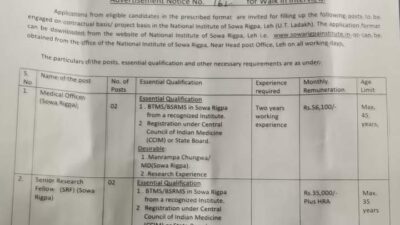Are Today’s Mothers Less Patient with Breastfeeding?
Shift from Breastfeeding to Artificial Feeding
Dr Fazal ul haq wani, Medical officer
PHC Shargole Writes
Early and Exclusive Breastfeeding: Essential for Infant Health
Breastfeeding has long been recognized as the gold standard for infant nutrition, providing unmatched health benefits for both the baby and the mother. Early and exclusive breastfeeding is particularly crucial in ensuring the best start in life for newborns. Despite its well-documented advantages, there has been a noticeable shift towards artificial feeding methods in recent years.
How Early Breastfeeding is Important and Useful
Early breastfeeding, or starting the nursing process within the first hour after the baby’s birth, is critical to the health of the child. This procedure induces the formation of colostrum, a nutrient- and antibody-rich fluid that is frequently referred to as the baby’s first vaccination. Early breastfeeding improves the baby’s digestive system, lowers the chance of neonatal mortality, and strengthens the link between mother and child.
Benefits of Exclusive Breastfeeding
Exclusive breastfeeding refers to giving them only breast milk and nothing else—not even water for the first six months of the baby’s life. The advantages are significant:
Nutritional Superiority: Specifically produced to meet the growing demands of the infant, breast milk provides all the necessary nutrients in ideal ratios.
Boost Immunity: Antibodies found in breast milk aid in the baby’s defense against bacteria and viruses, lowering the chance of infection.
Digestive Health: Breast milk is readily absorbed by the baby and aids in healthy functioning of the digestive system, helping to avoid problems like colic and constipation.
Cognitive Development: Research indicates that infants who are breastfed typically have improved cognitive development and higher IQs.
The practice of nursing has clearly been replaced in recent years by artificial feeding using products such as Lactogen.
Formula feeding may become preferable over breastfeeding due to factors such as hectic schedules, the need for convenience, and the influence of contemporary fashion. But this tendency raises the question of whether convenience is taking precedence over the undeniable health advantages of nursing.
The demands that are faced by new mothers are higher than ever in the fast-paced world of today. It can be quite difficult to strike a balance between employment, household duties, and social expectations; this frequently results in a preference for convenience over customs like breastfeeding. This tendency raises the question: Are mothers in the modern day less understanding when it comes to nursing? This perception is the result of multiple variables. First of all, the time-consuming aspect of nursing is rarely accommodated by the demands of modern living. Breastfeeding mothers who return to work soon after giving birth may find it difficult to stick to their schedule. The strain of balancing many obligations may cause a preference for formula feeding because it is thought to be more time- and convenience-efficient. Furthermore, current advertising and trends have a big impact. Formula milk manufacturers spend a lot of money on advertising to put their goods as superior or equal to breast milk. This advertising frequently aims to persuade recently ended up mothers that using formula is a practical and cutting-edge approach. Furthermore, the popularity of social media has increased peer pressure and trends, making many mothers feel pressured to fit in with what is perceived as the standard.
Impact of Artificial Feeding on Baby’s Health
While occasionally required, artificial feeding falls short of the health advantages offered by breast milk. Breast milk contains antibodies, live cells, and enzymes that are absent from formula milk. Extended consumption of formula milk may raise a child’s risk of allergies, asthma attacks, obesity, and potentially long-term diseases like diabetes.
Understanding Exclusive Breastfeeding and its Health Benefits
The goal of exclusive breastfeeding is to nurture a healthier future for the child, not merely to feed them. Stronger mother-child bonds, improved growth and development, and a healthy immune system are all made possible by it. Public health programs should place a strong emphasis on informing mothers about the unparalleled advantages of exclusive breastfeeding and offering assistance in overcoming any obstacles they may encounter.
The benefits of breast feeding exclusively from an early age are priceless, even if some people may find artificial feeding more convenient. Reversing the tendency towards formula feeding can be achieved by informing moms about these advantages and offering assistance.
It’s essential to understand that mothers’ lack of dedication or patience isn’t always the cause of this trend. Rather, it draws attention to the need for improved social structures, education, and support networks in order to make breastfeeding a practical and long-term choice for all moms. Mothers can feel more empowered to choose breastfeeding if their workplaces have facilities for nursing or expressing milk, if maternity leave is prolonged, and if public breastfeeding is accepted. In the end, nursing is a time-tested method of providing infants with the finest start in life and ought to be continued for the sake of coming generations.














Comments